Poetry Thursday and Friday: Louisa May Alcott
 September 10th, 2009 by jules
September 10th, 2009 by jules
though I doubt it.'”
(Click to enlarge spread.)
Here’s where I admit, with my librarian’s head hanging low and my face scarlet, that I have never read Little Women. Oh no, I haven’t. There. I’ve admitted this before quietly in comments at 7-Imp, but I’ve never said it so loudly here ’til now. And, of course, with two girls who are fairly soon going to be at a very good age for listening to this novel, I’m going to hold off even more, I think, and experience it then. With them.
But I’m not here today to talk about only Little Women. I’m here to tell you about—and share some art from—Yona Zeldis McDonough’s Louisa: The Life of Louisa May Alcott, illustrated by Bethanne Andersen (Henry Holt, August 2009). And this would be for an early Poetry Friday entry (a bit of a spotlight on Louisa, the poet, that is) and in my attempt, begun last week, to tell you about some more new picture book biographies currently on shelves.
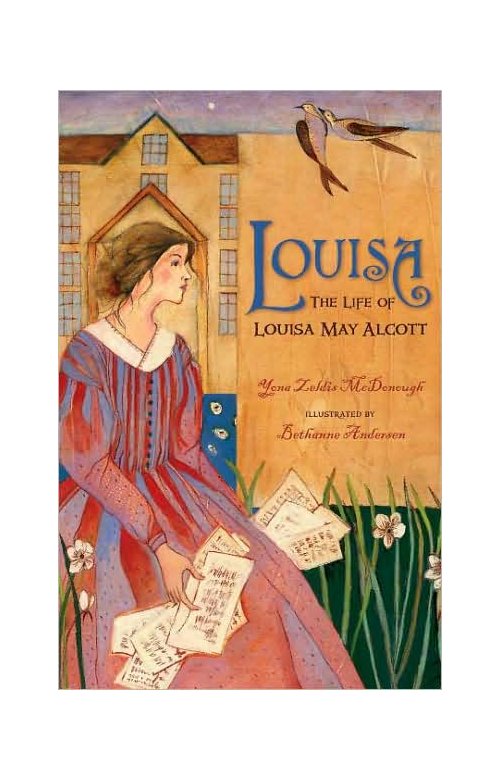
The book opens with the birth of Louisa, the second child to Bronson and Abigail Alcott: “She already had a big sister, Anna, and soon two more sisters, Elizabeth and May, joined her.” McDonough addresses the unconventional, “even strange,” ideas of Louisa’s father, who taught in Germantown, Pennsylvania: “He believed both boys and girls should be educated and that their opinions were important. He thought that children should be given the same respect as adults…People began to take their children out of his school, and soon it closed.”
(Click to enlarge spread.)
McDonough further explores pivotal moments in Louisa’s childhood — with poor, hard-working abolitionist parents who always encouraged her writing. She devotes an entire spread to Louisa’s education and love of reading, writing, history, geography, and being outside: “And sometimes she felt that nature was her best subject of all.” And she doesn’t skip over the fun parts of life with sisters, particularly seeing as how Louisa later used those experiences to create Little Women.
After the great failure that was Bronson’s attempt at communal farm life on the land known as Fruitlands, Louisa—back with her family in Concord again—taught school. Her writing also began to be noticed, Louisa taking the fees from her first published short story collection and tucking it into her mother’s stocking on Christmas morning. This is followed shortly by her sister Elizabeth’s death from scarlet fever.
In 1862, Louisa “made a startling decision: She would go to Washington as a nurse”:
and cheering these poor souls.'”
(Click to enlarge spread.)
After the publication of Little Women, to which naturally McDonough devotes a good deal of attention, she rounds out the story with Louisa’s final years: Louisa, though slowly being poisoned by the mercury in the medicine she received earlier during a bout of typhoid fever, travelled a great deal and visited New York City, visiting orphanages, hospitals, and asylums. When Louisa’s sister, May, died shortly after giving birth to her little girl, named after Louisa and called “Lulu,” Louisa took in Lulu and raised her:
Living comfortably and still taking care of what remained of her family, she continued writing and died from pneumonia in 1888 at the age of fifty-five.
The book closes with a spread entitled “The World According to Louisa May Alcott” (with quotes from her on childhood, nursing, poverty, fame, growing older, and more); “Louisa the Poet,” which includes poems she wrote at only eight and eleven years of age; “Interesting Facts About Louisa May Alcott, Her Writing, and Her Family”; and a recipe for New England Apple Slump. The latter is an odd choice. And random. But mmm. And, hey, I like odd. The final page lists “Important Dates in the Life of Louisa May Alcott” and a bibliography.
Andersen’s texturized gouache and pastel paintings rest, as you can see here, on an earthy palette — lots of oranges, greens, browns, and deep blues. There are many elongated lines in her rather stylized work, Publishers Weekly writing that it’s a “somewhat naïve style…While the fluid compositions evoke a carefree tone, textured gold backdrops, dark hues and serious facial expressions underscore the sadness and disappointments of Alcott’s short life, including a sister’s early death and her family’s poverty.” McDonough’s writing is accessible and thorough. The book’s a bit lengthy; this is for older elementary or middle-grade readers.
Since this is my one-day-early Poetry Friday entry, I’ll close with one of my favorite poems from Ms. Alcott. I’ll come back on Friday to update who is hosting the ‘ol round-up that day. Enjoy.
Edited to Add on Friday: The round-up today is being hosted by one of my favorite people, Elaine Magliaro, at Wild Rose Reader.
“Thoreau’s Flute”
We sighing said, “Our Pan is dead;
His pipe hangs mute beside the river
Around it wistful sunbeams quiver,
But Music’s airy voice is fled.
Spring mourns as for untimely frost;
The bluebird chants a requiem;
The willow-blossom waits for him;
The Genius of the wood is lost.”Then from the flute, untouched by hands,
There came a low, harmonious breath:
“For such as he there is no death;
His life the eternal life commands;
Above man’s aims his nature rose.
The wisdom of a just content
Made one small spot a continent
And turned to poetry life’s prose.“Haunting the hills, the stream, the wild,
Swallow and aster, lake and pine,
To him grew human or divine,
Fit mates for this large-hearted child.
Such homage Nature ne’er forgets,
And yearly on the coverlid
‘Neath which her darling lieth hid
Will write his name in violets.“To him no vain regrets belong
Whose soul, that finer instrument,
Gave to the world no poor lament,
But wood-notes ever sweet and strong.
O lonely friend! he still will be
A potent presence, though unseen,
Steadfast, sagacious, and serene;
Seek not for him — he is with thee.”
LOUISA: THE LIFE OF LOUISA MAY ALCOTT. Text copyright © 2009 by Yona Zeldis McDonough. Illustrations copyright © 2009 by Bethanne Andersen. Published by Henry Holt and Company, New York, NY. All rights reserved.
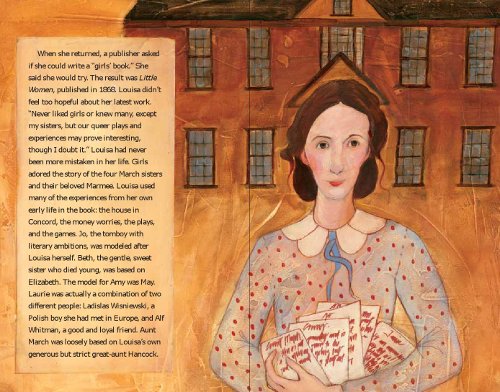
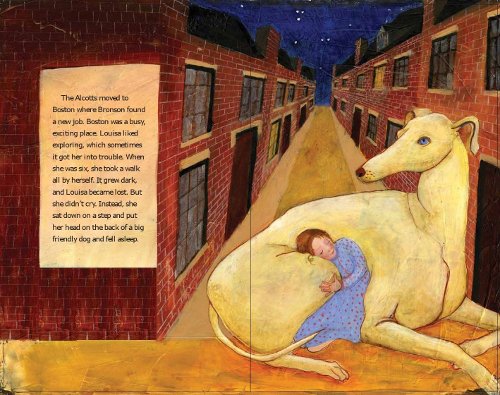
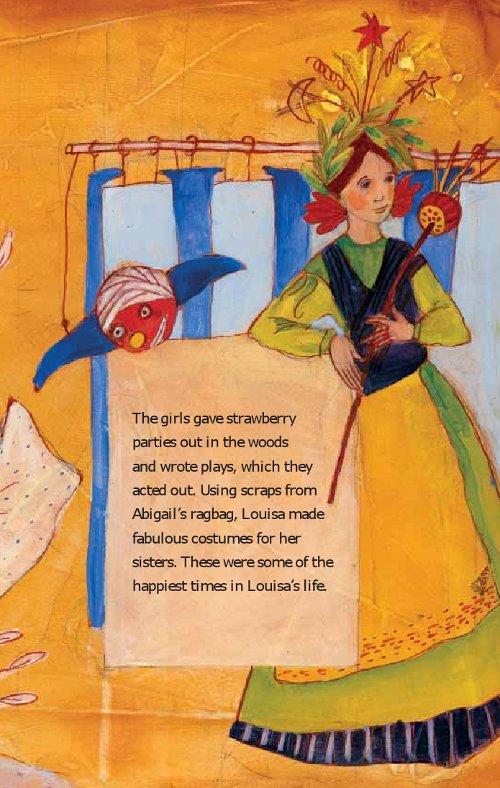
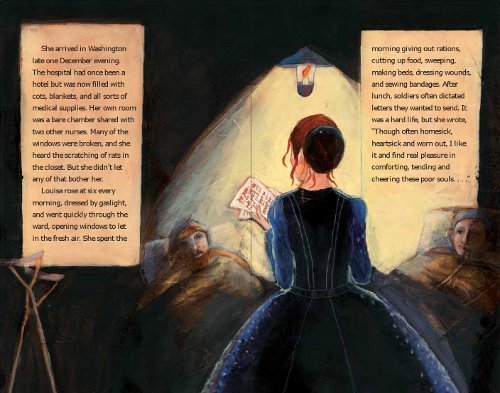
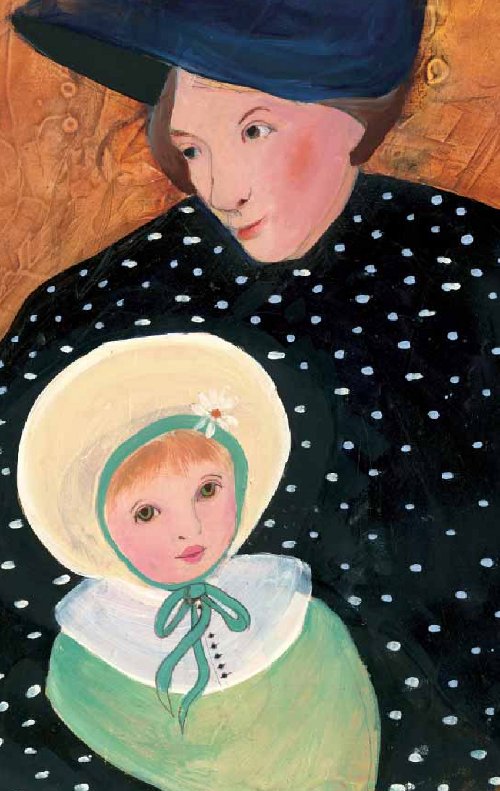

There are so many alleged “classic” books and movies and songs I’ve never read, seen or heard that I’ve given up feeling even remotely sorry about them. I’ve read Little Women and I don’t feel it changed my life; I am not sure you’re missing anything.
This book, however, is worth looking at, just from the perspective of the artwork. I LOVE that big dog, and imagining Louisa and her sisters putting on plays all and entertaining and taking care of each other is lovely. A simple life made gorgeous, “And turned to poetry life’s prose.”
*whispering* I’ve never read LW either.
A few years back, The Missus and I did a sort of literary tour of Massachusetts, starting at the North Shore (Gloucester and such) and ending in the Berkshires (Lenox etc.). In Concord, it flat-out amazed me how close together were the homes of the Alcotts, Emerson, Longfellow, and so on; and then when you go up into the cemetery…! It’s like the (English-speaking) universe discharged all its literary lightning in a single square mile or so.
Louisa’s ode to Thoreau is wonderful.
P.S. Please tell me that wasn’t one of the poems she wrote at ages 8 and 11.
Well I’m obsessed with Little Women, but it’s largely a generational thing; in a group of women writers over 50, you can bet most wanted to be Jo. I’m even more obsessed with Alcott’s real life, which was not at all as sweet, so I look forward to this book. And Apple Slump – well, they did nickname their house that. And apples do feature rather prominently in the garrett where Jo/Louisa wrote.
I hope your girls will sit through the book one day! And that the older one doesn’t claim Jo, the cool writer, as my older sister did, leaving me to be rather shallow (though kind of adorable) Amy. Not that I harbor her ill will all these decades later. Oh no.
I adored Little Women as a kid, and re-read it several times, along with its sequel, Little Men. I only read Jo’s Boys once. I was surprised as an adult to find out that Alcott kind of resented that those books were in such high demand – she liked her other fiction better. And like Jeannine, I really wanted to be Jo when I was a kid (still do), but I have to say that Jeannine skewed the age range too high – I’m only 45, so it’s probably the over 45 set (at least) who wanted to be Jo!
I’ve got a bio of Alcott and her father that I’ve been meaning to get to. Now I’m thinking I need to get my hands on this picture book first!
Oh, my – this might be one of my favorite posts ever!
What a heartsweetening rendition – I can’t wait to go buy this and read it with my soon-to-be 7 year old.
Jooooolie…You haven’t read Little Women???? You must…it really is a wonderful novel. I read it about a million times growing up…literally wore it out. And if you haven’t seen the movie with Winona Ryder, you must…only because Gabriel Byrne plays Dr. Baeur, and he is h-o-t, hot. 🙂
Well, I’m only 25, and this book changed my life :)!
Alcott is just one of those authors who will forever fascinate me, and I will read anything and everything I can get my hands on. I’m really excited about seeing this book. Thanks for sharing all the great quotes and spreads !
Would you look at the lovliness that is that book??? Oh.my.goodness.
I am an older sister and I did indeed lay claim to Jo. I was appalled for awhile that my parents hadn’t named me Jo.
Get those girls ready and then READ IT!!!
I have visited the house as well. The whole town of Concord is kind of creepy (in a good way I guess) with the history and ghosts of all these great people. We celebrate them in school and romanticize their lives and then visit their homes and the rooms in which all their heartbreaks occurred. It sticks with you like those places in your dreams that you revisit from time to time but that don’t really exist in your everyday life.
Concord, Mass. is one of my favorite places in all the world, mainly because of all the amazing authors who lived and worked there (including Hawthorne, don’t forget him), and the beauty of the town. I think I could easily live there someday. Walden Pond is just down the road, and is a magical setting. I have a bookshelf devoted to the Concord writers and revisit them every fall. McDonough’s book will fit there nicely.
P.S. If you like Steve Martin and Goldie Hawn, the comedy “HouseSitter” is set in Concord and is pretty darn amusing.
I love “House Sitter”! It’s one of my favorites–very PoMo. I’d forgotten it was set in Concord, though.
Tanita, that purposely out-of-proportion dog spread is my favorite, too. The final one in this post is very Mary Cassatt-like, isn’t it?
John, no, she didn’t write that as a child, I’m fairly certain. I go annually to Concord for a company meeting, but I never have the time or money (well, in this case, it’s ’cause time=money) to go early or stay late and sightsee. I hate that I’m THAT close to Walden Pond. And the other folks at the meeting are all used to living there and so I don’t even speak of my urge to visit some of these literary places. One day….
Jeannine, the Apple Slump does need to be made in my home.
Kelly, interesting that she felt that way about those books. I’m not surprised you knew that; you’re a rock-star scholar.
Sher, enjoy!
Tracy, duly noted. Will read it and watch it.
Jama, I hope you find this and enjoy it, too!
Liz, will do. But right now we’re finishing the tales of Tumtum and Nutmeg — and Gaiman’s tale of Odd — so it might wait a bit!
Chris and Jill, will have to look for that movie and, again, visit Concord one day!
Thanks for visiting, everyone! What great comments come from a post about Ms. Louisa.
I opened this page, and I saw that first Louisa illustration, and something shifted in me—went from tense to calm.
I tried to read Little Women and couldn’t get into it. It was really boring.
What a lovely post! I didn’t read Little Women until I was an adult, but I loved it. I can’t wait to get this beautiful book.
I loved reading Alcott as a child – I haven’t reread Little Women recently, but I did enjoy revisiting Eight Cousins and Rose in Bloom. And I have SUCH vivid memories of Jack and Jill and An Old Fashioned Girl. A little preachy sometimes, but wonderful.